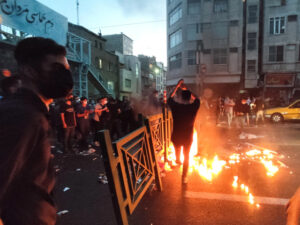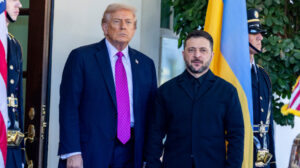Israeli armed forces remain deployed in sectors of southern Lebanon, although in theory today the sixty-day deadline they had to withdraw from the neighboring country’s territory under a cease-fire agreement with the Hezbollah movement, which is considered affiliated with Iran.
The Lebanese army yesterday Saturday denounced Israel’s “excuses” and said it was ready to “resume its deployment as soon as the Israeli enemy withdraws.”
Under the terms of the agreement that ended on November 27 the two-month-long war between the Hezbollah movement and Israel, only the Lebanese army and UN cyanocracies are now allowed to have forces deployed in southern Lebanon, where Israeli armed forces were supposed to complete their withdrawal today, January 26.
The latter’s units have moved away from the coastal areas of southern Lebanon, but continue to occupy sectors further east.
On the other hand, Hezbollah, considered to be weakened after the war, was forced to move its forces north of the Litani River, some 30 kilometers from the border, and destroy any remaining military infrastructure in the south.
Israeli Prime Minister Benjamin Netanyahu’s office said on Friday, however, that the withdrawal of Israeli troops would continue beyond the deadline.
“The ceasefire agreement was not fully respected by Lebanon, the process of withdrawal in stages will continue in agreement with the US,” he said. Washington is among the members overseeing the implementation of the agreement.
Accusing the Lebanese army and Hezbollah of not abiding by the terms of the agreement, he added that Israel would not allow “its communities and its citizens to be endangered” in the north of the country.
Hostilities between Israel and Hezbollah have forced 60,000 people in Israel and another 900,000 in Lebanon to flee their homes on both sides of the border.
Hezbollah MP Ali Fayyad ruled yesterday that “the pretexts invoked by Israel” are intended to “continue the scorched earth policy” and make “the return of residents (of southern communities) impossible.”
For his part, Lebanon’s new President Joseph Aoun referred during a meeting with his French counterpart Emmanuel Macron to “the need to oblige Israel to respect the terms of the agreement to maintain stability in the south,” a statement from his presidential services said yesterday.
He also insisted on the need for Israel to “end its repeated violations, in particular the destruction of border villages (…) which will prevent the return of their inhabitants.”
Despite the ceasefire, Israeli armed forces have been launching frequent bombings, saying they are acting against Hezbollah, and Lebanon’s official ANI news agency reports that they are dynamiting villages they still occupy in the south.
The truce, described as fragile, was marked by repeated mutual accusations of violations of the terms of the agreement.
Stressing that it took action to support its ally Hamas, Hezbollah has opened a front with Israel since the day after the Palestinian Islamist movement’s unprecedented assault on the southern part of Israeli territory on October 7, 2023, the trigger for the war in the Gaza Strip, where a ceasefire agreement has also been in effect since January 19.
But that front turned into open warfare in September, with Israel launching sweeping bombardments across the country, especially in the southern suburbs of Beirut, and delivering repeated harsh blows to the powerful Lebanese movement, especially killing its leader Hassan Nasrallah in a deadly bombing.
Hezbollah stressed Thursday that “any violation of the 60-day deadline will be considered a flagrant violation of the ceasefire agreement.”
It would oblige the Lebanese state to use “all necessary means (…) to recover its territory and wrest it from the clutches of the occupation,” the movement added, avoiding threatening to resume its attacks.
Ask me anything
Explore related questions





